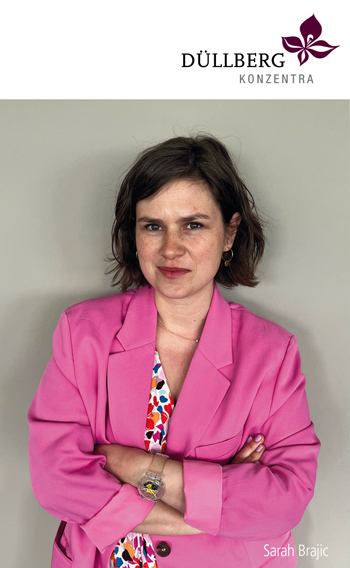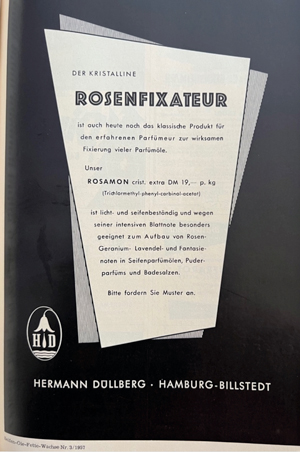
“The Situation is Becoming More Challenging, Expensive and Complex”
Sarah Brajic
Senior Perfumer at Düllberg-Konzentra
Perfumer Sarah Brajic (Düllberg-Konzentra) talks with SOFW about sustainability in the perfume oil industry: the challenges and how the industry can address them in a constructive way.
Time flies! This advert was published in 1957 in “Seifen-Öle-Fette-Wachse” (SOFW Journal = Soaps, Oils, Fats, Waxes Journal). What are the greatest challenges in the perfume oil industry today?
One of the biggest challenges – alongside increasingly restrictive regulations and supply chain issues – is the topic of sustainability. The perfume oil industry needs to adapt in order to meet the needs of our customers as well as those of our planet. To achieve this, we need greater transparency along the supply chain and a new perspective on our product portfolio. It’s a highly complex issue. What sustainability aspects should, and can we look at? How can we generate comparable data and values to transform our processes and resources sustainably in tandem with other industries?

How do you deal with the issue of the circular economy?
As in many other sectors, the circular economy is a complex topic in the perfume oil industry. There are numerous different aspects we can engage with, such as incorporating returnable containers and optimizing transport routes in the B2B segment. For perfume oil – which is used in consumer products such as shower gels or eau de parfums – we have ingredients that can end up in wastewater; here, biodegradability is an important factor. When it comes to recycling, our focus is on packaging. We can also optimize internal processes to ensure that waste is reduced to a minimum, a target we are always striving to achieve.
However, we believe that the greatest lever for change lies in optimizing our product range to include more sustainable product alternatives, such as using upcycled products obtained from waste products from other industries or developing new methods for obtaining natural isolates – without using more acreage to grow raw materials. There are so many different possibilities, all of which need to be weighed up in terms of their sustainability impact.
What are your customers’ requirements in this context?
Our customers face the same challenges as we do. Everyone wants maximum sustainability; consumers want products that do not harm the environment and are produced in a socially responsible manner. Ideally, they should be local, vegan, upcycled and biodegradable – and, in addition to all this, they should, of course, smell good. Implementing all these factors is not an easy undertaking. An average perfume oil contains between 20 and 100 raw ingredients from all over the world, such as ginger oil from India or neroli oil from Tunisia; these ingredients are made with the byproducts of other industries or petrochemical processes. Each individual ingredient needs to be scrutinized and evaluated from multiple highly complex angles. In some cases, synthetic alternatives may be more sustainable than the natural substances.
One topic is the endocrine effect and declaration of perfume oils. How do you deal with this issue?
Any issue that involves the safety of our customers and products is a top priority for us. Our extensively skilled, professional team for quality management, safety and regulatory matters works proactively on anticipating and addressing new issues and develops the appropriate safety profiles. This gives me the liberty to focus on creating appealing, suitable, and successful fragrances for our customers, secure in the knowledge that the perfume oils fully comply with the current regulatory standards and the requirements of our customers.
Last, but not least: more expensive raw materials, higher energy costs, supply chains. What impact do these factors have on the perfume oil market?
Although we all hoped the situation would become easier, this has unfortunately not been the case. In fact, it is apparent that in the long term the situation is set to become even more challenging, more expensive, and more complex, particularly in terms of sustainability.
The current situation and the difficulties sparked by the pandemic continue to present a great challenge to the industry. At the same time, these conditions also opened up the opportunity and the necessity to adapt to the circumstances. Those who, like us as a fragrance house, have seized the opportunity and worked to implement innovative improvements – for example, to ensure faster responsiveness, optimized processes, higher inventory levels and better supplier relationships – can build on this and will be better able to deal with the stricter requirements of the future.
Sarah Ajumah Brajic, Senior Perfumer at Düllberg-Konzentra, has over ten years of professional experience and specializes in Fine Fragrance, Personal Care and Natural Fragrances. She has an M.Sc., MBM and European Fragrance and Cosmetic Master from ISIPCA, and received her perfumery training at Drom. Her favorite fragrance is the scent of bitter orange blossom.
www.duellberg-konzentra.de



